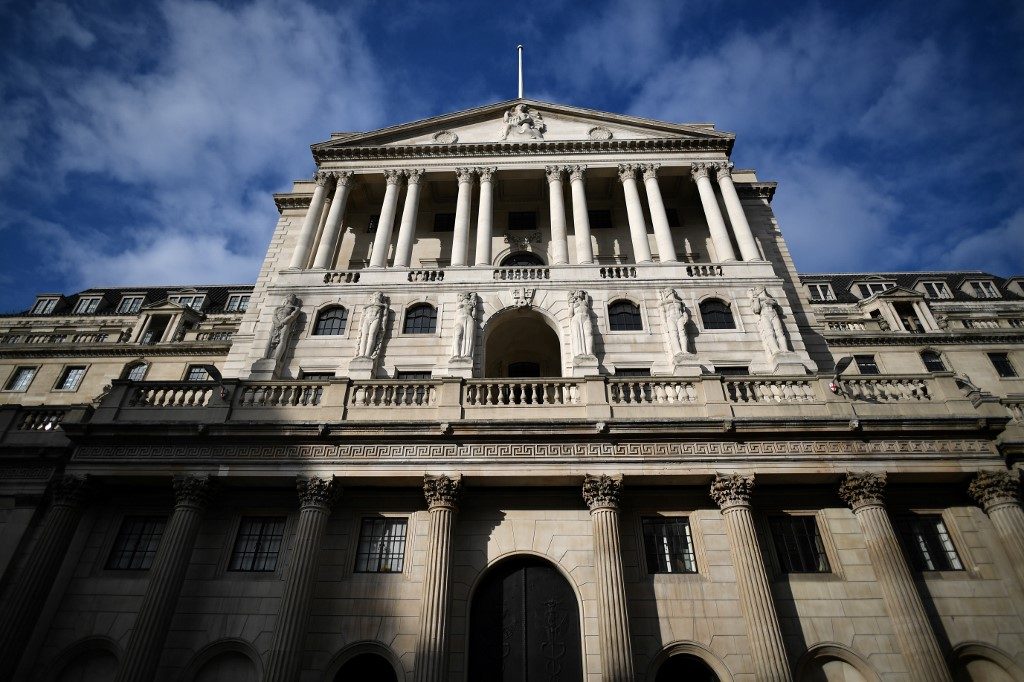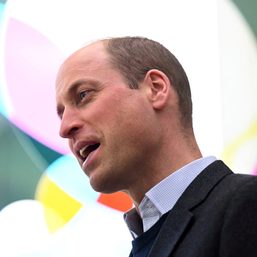SUMMARY
This is AI generated summarization, which may have errors. For context, always refer to the full article.

The Bank of England (BoE) on Thursday, November 5, unveiled an extra £150 billion in cash stimulus and forecast a deeper coronavirus-induced recession as England began a second lockdown.
Holding its benchmark interest rate at a record-low 0.1%, the BoE added that it was lifting quantitative easing (QE) stimulus by the equivalent of $195 billion as it seeks to boost lending by retail banks and stimulate United Kingdom economic growth.
It forecast the British economy to shrink 11% this year, worse than prior guidance of a 9.5% contraction.
Output was set to rebound by 7.25% next year, but less than the central bank’s previous prediction of 9% growth.
British finance minister Rishi Sunak later announced a new multibillion-pound coronavirus support package, notably a lengthy extension of his government’s furlough jobs scheme to the end of March.
“The bank’s forecasts…show economic activity is supported by our substantial fiscal and monetary policy action,” the chancellor of the exchequer told lawmakers as he launched his latest plan to combat virus fallout.
New lockdown
England on Thursday began a minimum 4 weeks of stay-at-home restrictions, as Prime Minister Boris Johnson’s government seeks to stem a second wave of COVID-19 after similar action elsewhere in Europe.
The initial lockdown that lasted around 3 months until mid-June sparked Britain’s deepest recession on record.
The BoE on Thursday said “the outlook for the economy remains unusually uncertain.”
The outlook, it added, “depends on the evolution of the pandemic and measures taken to protect public health, as well as the nature of, and transition to, the new trading arrangements between the European Union and the United Kingdom” post-Brexit.
“It also depends on the responses of households, businesses, and financial markets to these developments,” the bank said in a statement.
BoE Governor Andrew Bailey, speaking to reporters on a conference call, described the bank’s latest action as a response to an “extraordinary” global health emergency.
Jobs support
Sunak’s extension of the furlough scheme for at least one year sees the state continue to pay up to 80% of wages for millions of private-sector workers across the UK.
“As the Bank of England has said, the economic recovery has slowed and the economic risks are skewed to the downside,” he told parliament.
“Given this significant uncertainty, the worsening economic backdrop, and the need to give people and businesses security through the winter, I believe it is right to go further.”
The scheme, first introduced as the UK entered an initial lockdown in late March, had been due to end on October 31 and replaced by a much watered-down package.
But with England again in lockdown, Sunak had extended the scheme by one month before deciding to go much further with the latest announcement.
Sunak on Thursday rejected accusations from the main opposition Labour party that his Conservative government had been slow to respond to virus-ravaged businesses.
“It’s not a weakness to be agile and fast-moving but rather a strength, and that will not change,” he said, adding the government had provided £200 billion of fiscal support since March.
Thursday’s BoE announcement took the central bank’s total QE stimulus amount to £895 billion.
The bank has now pumped out £450 billion of fresh QE during the pandemic.
Prior to this it had pumped hundreds of billions of pounds into the UK economy over the past decade in the wake of the global financial crisis and Brexit.
Under QE, the BoE purchases assets such as government and corporate bonds, with the aim of boosting lending and investment to stimulate economic activity. – Rappler.com
Add a comment
How does this make you feel?


![[Time Trowel] Evolution and the sneakiness of COVID](https://www.rappler.com/tachyon/2024/02/tl-evolution-covid.jpg?resize=257%2C257&crop=455px%2C0px%2C1080px%2C1080px)







There are no comments yet. Add your comment to start the conversation.